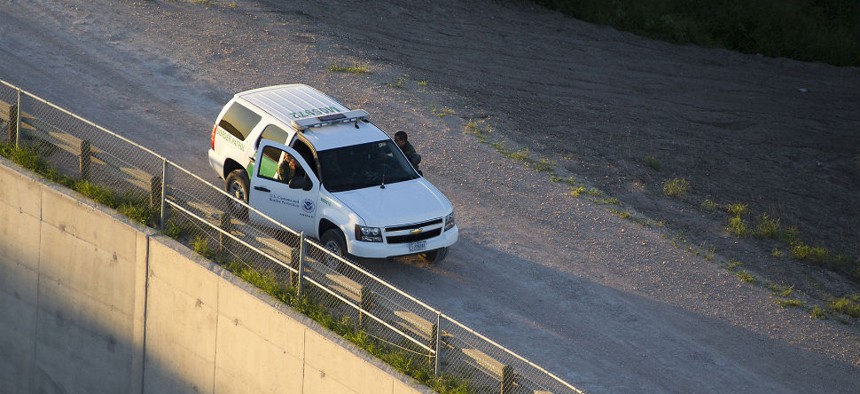
South Texas Border Patrol agents provide security in the Rio Grande Valley in September. United States Customs and Border Protection
Both Parties Looking to Pare Down Obama's Border Funding
Senate Democrats propose to cut $1 billion from the president's request; House Republicans are expected to unveil an even deeper cut.
House Republicans are planning on Wednesday to unveil their own plan to deal with the border crisis that would provide less than half of the $3.7 billion in emergency spending requested by President Obama.
In a closed-door meeting at the Capitol, House Appropriations Chairman Harold Rogers is to lay out a GOP funding alternative that senior aides have described as between $1.3 billion and $1.5 billion.
Rogers himself said Tuesday that the spending will be entirely offset by cuts elsewhere in the budget—and geared to providing agencies and other operations involved in dealing with the surge of unaccompanied minors to the U.S.-Mexico border through Jan. 1.
Meanwhile, Senate Democratic leaders are working on a supplemental spending bill that would grant the White House $1 billion less than it sought to address the influx of minors from Central America at the nation's southern border.
Also on Wednesday, Republican Rep. Kay Granger of Texas is expected to release a "set of principles" that have been put together by herself and other members of a House "border working group" created by Speaker John Boehner on immigration policy.
Most of the working group's policy recommendations are expected to become part of the House Republican alternative to Obama's proposal. They include:
- The need to provide for more National Guard involvement along the border, including in humanitarian relief efforts, such as providing food, shelter, and health care.
- Changing a 2008 anti-trafficking law to allow immigrant children at the border to be voluntarily and more swiftly returned to their home countries rather than being held for deportation hearings. Many Senate and House Democrats, including the Congressional Hispanic Caucus, have already said they would oppose this.
- Putting an end to the so-called "catch and release" system for unaccompanied minors, and instead requiring that they be detained until they see an immigration judge. The recommendations will call for this to happen within five to seven days.
- "Changing the narrative" by promoting—through advertisements in Central America—the notion that the U.S. will send immigrants back home if they do not cross the border legally.
In the Senate, Appropriations Committee Chairwoman Barbara Mikulski of Maryland is crafting the $2.7 billion legislation along with leadership in the hopes of getting it to the floor before the Senate recesses for August.
"The United States has an obligation to help resolve these crises, but is running out of money," Mikulski said in a statement. "The costs are real and urgent. We don't save money by refusing to act or through delay."
Democrats are slashing nearly $1 billion from the president's request because they're angling to get Republican support, a senior Democratic aide said. Republicans have signaled they oppose the president's request, characterizing it as a blank check, and it's unclear whether they'll back Mikulski's downsized version of the legislation.
An aide to Minority Leader Mitch McConnell said he had not seen the measure yet, but raised a question about whether reforms to legal authorities would be included.
The Senate bill would authorize the funding through the end of the year, the Democratic aide said. It would also include $225 million for Israel's Iron Dome missile-defense system, which has gained notoriety in recent days for its effectiveness in repelling rockets from Hamas.
The bill will carry $615 million to address wildfires as well.
Left out of the bill are changes to the immigration system, which some lawmakers had sought.
Majority Leader Harry Reid of Nevada said he's hopeful the Senate could pass the measure soon, but he did not guarantee it.
"We feel comfortable where we are and would hope that Republicans would support us," he said.
The bill's path to passage is fraught. For one, the Senate has struggled all year with appropriations measures on the floor, with Reid and McConnell disagreeing over how to proceed on amendments. So far, the Senate has passed none of the 12 annual spending bills.






